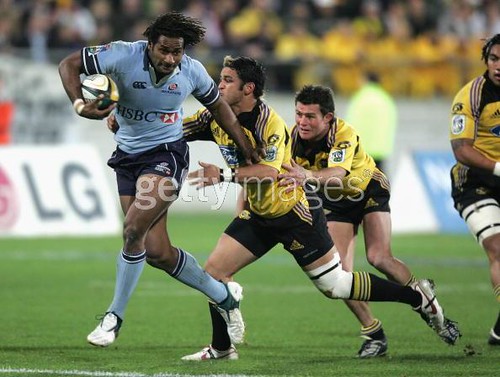Flair versus strength
It was semi-final rugby. Low-scoring, high pressure stuff.
The first ten minutes saw some fantastic strength in defence from the Hurricanes. Through multiple phases, the yellow shirts repelled the blues with the Hurricane center pairing of Umaga and Nonu being immense. Collins is something freakish and opposition must dread being tackled by him.
During the first ten, the Waratahs botched fielding of three kicks and this gave the 'Canes chances to get into their half. They goaled two penalties from this.
Then the 'Tahs backline sparked to life through Tiquiri and Rogers. There is something about Australian sides on attack. Their skill levels are fantastic and the key is their command of the basics, including, "Let the ball do the work."
Further, Whittaker is a scrummie who does brilliantly what I believe is the position's most critical function: he gets to rucks and clears quickly. As Murray Mexted said, "He clears from the ground without picking the ball up."
It was exactly such quick clearance that led to the Waratah's first try after a rampaging Tiquiri run. Watching the big guy's pace, power and skills, it is easy to see what Mallet is looking for in a big powerful winger.
This match exhibited many of the characteristics of a South African side against the Aussies. Big powerful defence and power on attack and defence ('Canes) against skills and creativity ('Tahs). Both have their place and with the right tactics can be winning games. This was shown by Fa’atau's try. The Hurricanes turned the ball over through a massive defensive scrum and from the resulting 'Canes scrum, worked a basic wraparound from the right winger taking the reverse pass from Umaga. It was the powerplay and it worked.
The Canes also use their powerful loose trio on attack and Collins also often takes slow-phase ball in the flyhalf channel, allowing other players to work off him. This almost led to a try 10 minutes into the second half as Collins drew the rather ordinary looking Daniel Halangahu and then offloaded to Chris Masoe who ran powerfully upfield breaking tackles and setting up a ruck ten meters out. They were unlucky not to score as the Waratah's turned the ball over.
Failing to score is what eventually cost the Hurricanes. The Waratahs made infrequent trips into the 'Canes half, but twice when they did they forced Hurricanes errors and goaled penalties to take the lead. They were the only scores to punctuate long periods of Hurricanes possession and territorial domination.
Gopperth immediately got the 'Canes back into the game with a long range penalty. This sparked 10 minutes of frenetic attack by the Hurricanes. Despite the attack, again the 'Canes could not score but were good enough to retain possession until the final whistle.
Hurricanes 16 - Waratahs 14. Well done guys. Hard semi-final rugby.
What can South African sides learn about power versus flair?
Given the debate about power versus flair in the South African environment, what could we learn from this game? One is the oldest lesson in rugby - power game or not, the game might not be won but it can certainly lost through lack of a competitive forward game. This is the basis of the Crusaders' game. They have both power and flair, but their forward power ensures they are never dominated. The second lesson is that a power game can carry journeyman players - the 'Canes have a virtually anonymous tight five. But through powerful scrumming and an exceptional loose trio, they play a game that keeps them competitive.
What is the impact of lack of flair? You have to say that the 'Canes should have scored more often from the quantity of possession and territory they enjoyed in the second half. I always felt that the Waratahs might easily have got back into the game against the run of play through their superior creativity. The 'Canes against the Crusaders? I'm not sure their forwards have the grunt. The Bulls versus the 'Canes? Well it depends on whether the Bulls forwards show up or not.
Good Reffing
Kaplan reffed a great game - he lets things flow and we saw extended periods of play free of the whistle. Mexted complimented him as one of the two best referees in the Super 14 together with Lyndon Bray. Kaplan allowed players to crash into rucks off their feet and while this led to greater continuity it meant the rucks were less of a contest but more prone to error. It is little wonder then that sides are turning to the maul as a means of controlled error free ball - and also a means of winning acres of field.
The first ten minutes saw some fantastic strength in defence from the Hurricanes. Through multiple phases, the yellow shirts repelled the blues with the Hurricane center pairing of Umaga and Nonu being immense. Collins is something freakish and opposition must dread being tackled by him.
During the first ten, the Waratahs botched fielding of three kicks and this gave the 'Canes chances to get into their half. They goaled two penalties from this.
Then the 'Tahs backline sparked to life through Tiquiri and Rogers. There is something about Australian sides on attack. Their skill levels are fantastic and the key is their command of the basics, including, "Let the ball do the work."
Further, Whittaker is a scrummie who does brilliantly what I believe is the position's most critical function: he gets to rucks and clears quickly. As Murray Mexted said, "He clears from the ground without picking the ball up."
It was exactly such quick clearance that led to the Waratah's first try after a rampaging Tiquiri run. Watching the big guy's pace, power and skills, it is easy to see what Mallet is looking for in a big powerful winger.
 |
| Tiquiri - rampaging on attack Picture: Getty Images |
This match exhibited many of the characteristics of a South African side against the Aussies. Big powerful defence and power on attack and defence ('Canes) against skills and creativity ('Tahs). Both have their place and with the right tactics can be winning games. This was shown by Fa’atau's try. The Hurricanes turned the ball over through a massive defensive scrum and from the resulting 'Canes scrum, worked a basic wraparound from the right winger taking the reverse pass from Umaga. It was the powerplay and it worked.
The Canes also use their powerful loose trio on attack and Collins also often takes slow-phase ball in the flyhalf channel, allowing other players to work off him. This almost led to a try 10 minutes into the second half as Collins drew the rather ordinary looking Daniel Halangahu and then offloaded to Chris Masoe who ran powerfully upfield breaking tackles and setting up a ruck ten meters out. They were unlucky not to score as the Waratah's turned the ball over.
Failing to score is what eventually cost the Hurricanes. The Waratahs made infrequent trips into the 'Canes half, but twice when they did they forced Hurricanes errors and goaled penalties to take the lead. They were the only scores to punctuate long periods of Hurricanes possession and territorial domination.
Gopperth immediately got the 'Canes back into the game with a long range penalty. This sparked 10 minutes of frenetic attack by the Hurricanes. Despite the attack, again the 'Canes could not score but were good enough to retain possession until the final whistle.
Hurricanes 16 - Waratahs 14. Well done guys. Hard semi-final rugby.
What can South African sides learn about power versus flair?
Given the debate about power versus flair in the South African environment, what could we learn from this game? One is the oldest lesson in rugby - power game or not, the game might not be won but it can certainly lost through lack of a competitive forward game. This is the basis of the Crusaders' game. They have both power and flair, but their forward power ensures they are never dominated. The second lesson is that a power game can carry journeyman players - the 'Canes have a virtually anonymous tight five. But through powerful scrumming and an exceptional loose trio, they play a game that keeps them competitive.
What is the impact of lack of flair? You have to say that the 'Canes should have scored more often from the quantity of possession and territory they enjoyed in the second half. I always felt that the Waratahs might easily have got back into the game against the run of play through their superior creativity. The 'Canes against the Crusaders? I'm not sure their forwards have the grunt. The Bulls versus the 'Canes? Well it depends on whether the Bulls forwards show up or not.
Good Reffing
Kaplan reffed a great game - he lets things flow and we saw extended periods of play free of the whistle. Mexted complimented him as one of the two best referees in the Super 14 together with Lyndon Bray. Kaplan allowed players to crash into rucks off their feet and while this led to greater continuity it meant the rucks were less of a contest but more prone to error. It is little wonder then that sides are turning to the maul as a means of controlled error free ball - and also a means of winning acres of field.




0 Comments:
Post a Comment
<< Home